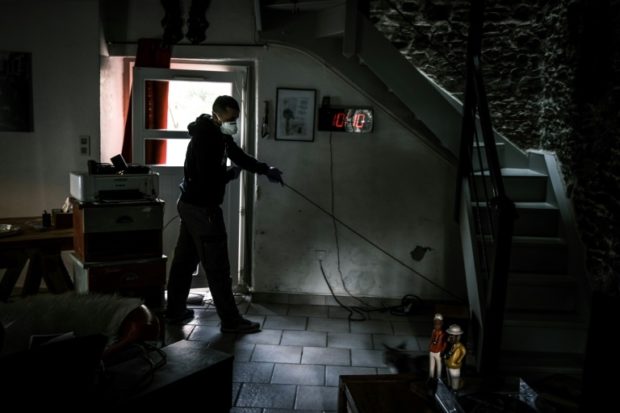Study shows how quickly coronavirus spreads at home

Image: AFP/Jean-Philippe Ksiazek
The novel coronavirus is twice as infectious within households than similar diseases such as SARS, with a substantial number of additional infections spreading before a COVID-19 sufferer shows any symptoms, according to modelling released Thursday.
Researchers based in China and the United States said their findings could have profound impacts on reducing the number of new infections as the pandemic progresses.
Using data on 350 COVID-19 patients and nearly 2,000 of their close contacts in the city of Guangzhou, China, the researchers estimated the virus’ “secondary attack rate” — that is, the probability that an infected person transmits the disease to someone else.
They found that while the average patient had just a 2.4% chance of infecting someone they did not live with, that figure jumped to 17.1% — around one in six — among cohabitants.
According to their models, which rely on data collated in January and February but have been updated to reflect the latest developments, the likelihood of household infection was highest among over-60s, and lowest among under-20s.
The overall chances of infecting a family member or live-in partner with COVID-19 are twice as high as with SARS, and three times higher than MERS, another coronavirus, they found.
Significantly, the researchers found that the probability of a COVID-19 carrier infecting a family member or flatmate was significantly higher — 39% — before they started showing symptoms than afterward.
This suggests that the virus is easily transmissible within its incubation period and may be passed on by individuals who don’t know they are infected.
The team said that isolation within households cut the total number of COVID-19 cases among the study cohort by 20% to 50% compared with no quarantine.
“Although the effect of case isolation seems moderate, the high infectivity of the virus during the incubation period suggests quarantine of asymptomatic contacts could have prevented more onward transmissions,” said Qin-Long Jing from the Guangzhou Center for Disease Control and Prevention.
Many European nations, before implementing weeks-long lockdowns, issued public health advice only to stay at home if an individual was sick — that is, showing symptoms typical to the virus.
The research suggests that may have already been too late to prevent COVID-19 circulating widely.
Writing in a linked comment, Virginia Pitzer from the Yale School of Public Health said that a “key difference” between COVID-19 and other coronaviruses was its “substantially higher” probability of transmission in its incubation period.
She said the research, published in The Lancet, “confirms the relative importance of pre-symptomatic transmission and the relationship between older age and susceptibility, key insights which should inform design of intervention strategies.” IB
RELATED STORIES:
Vitamin D deficiency linked to COVID-19 severity by new research
Rates of ‘symptomless’ COVID-19 infections may be higher than previously thought, study finds
For more news about the novel coronavirus click here.
What you need to know about Coronavirus.
For more information on COVID-19, call the DOH Hotline: (02) 86517800 local 1149/1150.
The Inquirer Foundation supports our healthcare frontliners and is still accepting cash donations to be deposited at Banco de Oro (BDO) current account #007960018860 or donate through PayMaya using this link.